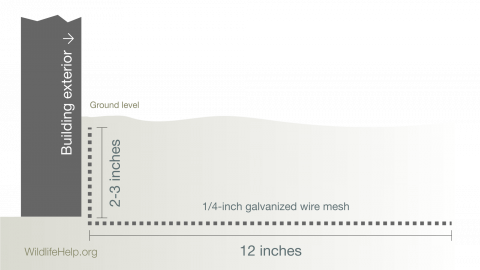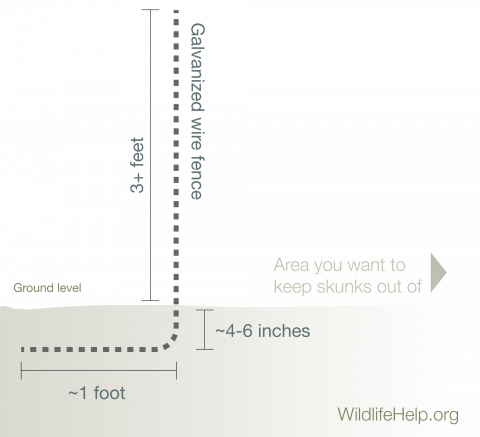Find help...
How to keep skunks out of my yard and out from under my porch in New Jersey | Skunk
New Jersey > Animal is under my porch, deck or shed > Skunk
How to keep skunks out of my yard and out from under my porch
Step 1
Eliminate potential den and burrow locations
-
Remove wood, rock and debris piles, or any other cover that would attract foraging skunks.
-
Cover window wells with plastic or metal mesh covers.
-
Close off the space beneath porches, decks, and outbuildings to keep skunks from denning there. Skunks will dig their own dens, but will also use spaces under sheds, decks, porches, trailers, and crawl spaces if available.
-
Skunk-proof these areas using heavy gauge galvanized hardware cloth
-
Cover openings with wire mesh, sheet metal, or concrete.
-
To prevent digging, bury hardware cloth or weave fences 2 inches below the ground
-
Bend the mesh at a right angle and extend it at least 12 inches away or outward from the location
-
Dig underground a few inches and attach hardware cloth to the lower edge of the structure.
-
If you have looser, sandy soil, increase the depth and length of the mesh. In northern climates where skunks have more motivation to find shelter, you may need to bury the mesh deeper.
-
Step 2
Make gardens less appealing
Skunks are opportunistic omnivores. Gardens provide several appetizing options for them. A good way to keep them away is to make the garden less ‘tasty’ and to make it seem less welcoming.
-
Sprinkle cayenne pepper on and around vegetable gardens and reapply after rain. Mammals do not enjoy “spicy” flavors and they can be an effective deterrent.
-
You can also adhere the cayenne to the plants with petroleum jelly products if you are worried about wind. Be careful not to touch your eyes or face after applying cayenne pepper!
-
-
Install motion-sensing lights in your yard. Motion-sensing lights can scare away wildlife.
-
Playing a talk radio station may scare wildlife and keep them away from gardens.
-
Alternatively, skunks may not like citrus smells. Try laying lemon and orange peels in your garden to see if it deters them. Be aware, however, that this may attract other species of wildlife.
-
You can soak old rags in ammonia and place under decks and porches. Skunks will be deterred by the smell and leave the rags alone. However, use caution if you have children or pets as ammonia is toxic to humans and animals and can be dangerous if swallowed or inhaled. Note that ammonia evaporates, and you will need to re-soak the rags once they dry out to continue to deter skunks.
Step 3
Remove food sources
-
Remove any aromatic garbage from your property and use a skunk-proof garbage can.
-
If you compost, make sure to mix compost with soil or wood ash to make the compost less attractive. Additionally, if you compost food scraps, bury the food scraps at least eight inches into the ground, and cover with a wire mesh hardware cloth, and at least place a heavy object over the hardware cloth to prevent digging.
-
Reduce habitat for rodents and chipmunks as they are a source of food for skunks and share many food sources. Seal small holes and cracks around your home and outbuildings.
-
Skunks will eat bird seed. Take bird feeders down, put them away at night, or at least use bird feeders that capture fallen seed to reduce the amount on the ground.
-
Sweep up seed spilled by birds under feeders as fallen seed attracts skunks and rodents.
-
Store birdseed, flower seeds, and other foods that might attract skunks in skunk-proof containers such as garbage cans or totes in your garage or shed. Make sure they are tightly sealed, even if they are stored in a garage or shed.
Source:
Laws and regulations to be aware of
While we attempt to provide guidance about state and federal regulations pertaining to specific species and control techniques, we do not provide information about local jurisdictions (city, town, county, etc.) where regulations may be more restrictive, especially as it applies to discharge of firearms, transport of animals or use of trapping equipment. Contact your local city or county government to inquire further. No guarantee is made that information (or lack of information) associated with a species or control technique is completely accurate or current. You should become familiar with federal, state and local laws before beginning any wildlife control activities. |





